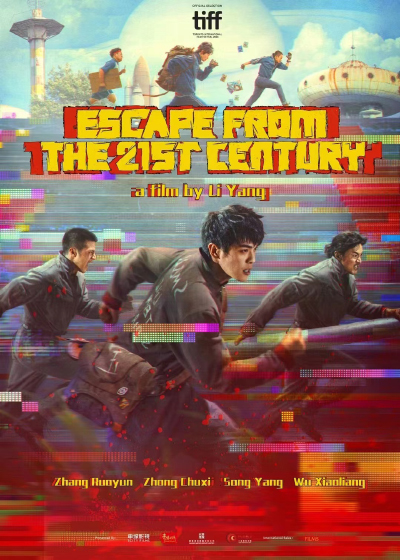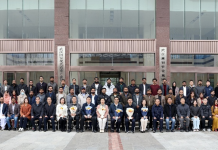“I was even more interested in film than in my actual major,” he told Beijing Review. Following his passion, when he had completed his master’s degree in international economics, he went on to pursue a master’s degree in filmmaking at the Escuela de Cine y Animation de Barcelona.
Passion for film
Wanting to see China in person, Magar, then a fresh graduate, arrived in the country in 2008. “Initially, I didn’t intend to work in the film industry, but I was also not motivated enough to work in a consulting or finance company, so I was looking for a job related to the film business.”
Finding an ideal position in China’s film industry in the late 2000s proved to be quite challenging, but he managed to find one in a small film production company. “The Chinese film market was not as big as now at the time in terms of screen numbers and box-office. But that time coincided with the rise of online video platforms such as Youku, Tencent Video, and iQiyi, which were in need of a large array of overseas films to diversify their film sources. So I started to import international movies,” he said.
Magar began introducing award-winning films from the three major European film festivals, namely France’s Cannes Film Festival, Italy’s Venice Film Festival and Germany’s Berlin Film Festival. “At that time, I was not sure what kind of films would work in the Chinese market. At the very least, everyone recognized major film festivals, so I selected a package of award-winning films,” he recalled.
“Back then, these online video platforms in China were still in the early stages of importing films on a large scale, so they didn’t offer much [in payment], which also meant that our profit margins for every film were very limited,” Magar admitted.
Despite this, with his passion for film, he persisted in acting as a middleman, selecting films to be imported while negotiating with Chinese companies, aiming to ensure that each film is sold to multiple video platforms. Fortunately, the volume of imports was large, so the business was still profitable.
In addition, as a film selector, Magar could occasionally select films that he liked. “I am a big fan of Éric Rohmer (a filmmaker of the French New Wave), so it made me very proud to be the first person to introduce his films to China,” he said. Looking back, he found the work very fulfilling.
Also, he became the first person to bring award-winning films from the three major European film festivals to China in bulk. “From 2008 to 2014, I bought more than 100 overseas films and documentaries for China,” Magar told Beijing Review.
Gradually, his role expanded from selling movie copyrights to video platforms to introducing movies to theaters. It requires him to negotiate with different copyright companies, watch the films they pitch, and then determine whether they meet the demands of the Chinese market. Sometimes he also needed to travel back and forth between film festivals to find and purchase films.
The international demand for Chinese films has grown, and Magar, now General Manager of Fortissimo Films, is also committed to bringing Chinese films to the international market.
“My role transitioned from a buyer to a seller. I began promoting Chinese films at overseas film festivals,” He acknowledged that the success of sales depends on the quality of the film. “This necessitates our pursuit of high-quality films in China,” he added.
Craving for creativity
Last year, Magar’s company was engaged in the international sales of the Chinese animation film Deep Sea, screening it at several prestigious film festivals, including the Berlin Film Festival, Tribeca Film Festival, Tokyo Film Festival, and Sydney Film Festival.
Following its release in France, Deep Sea performed remarkably well at the box office. “Many French viewers thought it was better than Pixar or Disney productions due to its unconventional narrative style and refreshing visual expression,” Magar said.
During a screening in New York, some American audiences reacted passionately. One lady was so touched that she cried after watching it. She embraced Magar and said, “I don’t know who you are exactly, but I recognize you as part of this film’s team—please ensure my sentiments reach the director.”
“Undoubtedly, this kind of experience is invaluable, especially for us film lovers. It’s very rewarding to see films that we recognize bridge cultural differences and touch people in different continents,” he added.
Given the booming online video platforms available in China, attracting audiences to the cinema is no easy feat. Magar said he believes a film must possess great creativity and theatrical impact to do so.
And Magar has seen Chinese films that display these characteristics. He is now in charge of the international sales of Chinese film Escape From the 21st Century. “It possesses these qualities by combining live action with animation, and using a very innovating narrative form,” he said. He added that every time he selects films to distribute, he needs to consider whether overseas audiences will understand, like or be moved by them. Magar sees that possibility in this film.

In his view, the beauty of cinematic art lies in creativity. “We’ve been making films for about 150 years, but the world changes and with that there are still infinite possibilities for directors to tell stories in different ways,” he said
“I see creativity abounds in Chinese films. That’s why I’m still here in China, after 15 years,” he added. –The Daily Mail-Beijing Review news exchange item






